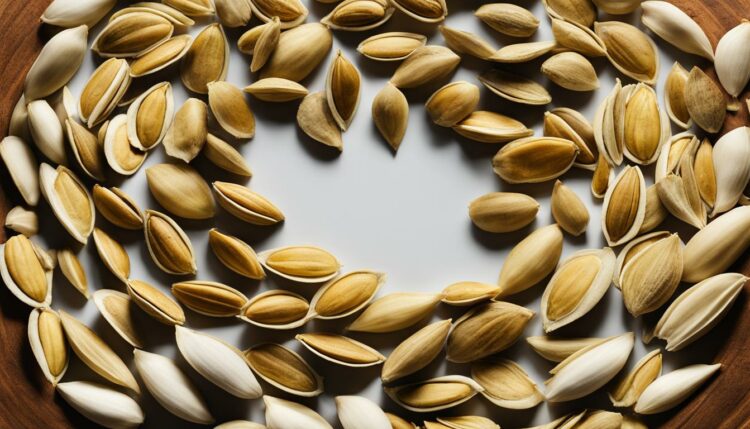Pumpkins are a nutritious and versatile winter squash that offers numerous health benefits. They are rich in vitamins, minerals, and antioxidants, making them a valuable addition to a healthy diet. Pumpkin is low in calories and high in fiber, which can aid in weight loss and promote a healthy digestive system.
Additionally, the vitamin A content in pumpkin can improve vision and support a strong immune system. The antioxidants found in pumpkins may also help reduce the risk of chronic diseases, such as cancer and heart disease.
Furthermore, pumpkin can contribute to healthy skin, thanks to its high content of beta carotene and other skin-boosting nutrients. Whether you enjoy pumpkin in recipes, consume pumpkin seeds, or use pumpkin-based skincare products, incorporating pumpkin into your lifestyle can have numerous benefits for your overall health and well-being.
Key Takeaways:
- Pumpkins are rich in vitamins, minerals, and antioxidants.
- Pumpkin is low in calories and high in fiber, promoting weight loss and a healthy digestive system.
- The vitamin A content in pumpkin improves vision and supports the immune system.
- Pumpkin’s antioxidants may reduce the risk of chronic diseases like cancer and heart disease.
- Pumpkin can contribute to healthy skin due to its high beta carotene and skin-boosting nutrient content.
Nutrient Profile of Pumpkin
Pumpkin is highly nutritious, offering an impressive array of vitamins and minerals. One cup of cooked pumpkin contains essential nutrients such as vitamin A, vitamin C, potassium, copper, manganese, vitamin B2, vitamin E, and iron.
It is also a good source of magnesium, phosphorus, zinc, folate, and several B vitamins.
The high beta carotene content in pumpkins provides a valuable source of vitamin A, which is vital for eye health and immune function.
Additionally, pumpkins contain antioxidants, including alpha-carotene, beta-carotene, and beta-cryptoxanthin, which can help protect cells from damage caused by free radicals.
Nutritional Content of Cooked Pumpkin (1 Cup, 245g)
| Nutrient | Amount |
|---|---|
| Vitamin A | 245% of the Daily Value (DV) |
| Vitamin C | 19% of the DV |
| Potassium | 564mg |
| Copper | 0.3mg |
| Manganese | 0.2mg |
| Vitamin B2 | 0.1mg |
| Vitamin E | 2.5mg |
| Iron | 1.4mg |
Health Benefits of Pumpkin
Incorporating pumpkin into your diet can provide numerous health benefits. Let’s explore how this versatile winter squash can contribute to your overall well-being.
Pumpkin for Weight Loss
One of the remarkable benefits of pumpkin is its potential to support weight loss. Pumpkin is low in calories and high in fiber, which can help keep you feeling fuller for longer periods. The high fiber content aids in healthy digestion and prevents overeating.
By adding pumpkin to your diet, you can promote satiety, maintain a healthy weight, and support your weight loss goals.
Pumpkin for a Strong Immune System
Pumpkin is a rich source of immune-boosting nutrients, including vitamin A and vitamin C. Vitamin A plays a crucial role in supporting the immune system and enhancing its ability to fight off infections and illnesses.
Vitamin C is known for its antioxidant properties, which can help strengthen the immune system and protect against oxidative stress. By incorporating pumpkin into your diet, you can support a strong immune response and maintain your overall health.
Pumpkin for Chronic Disease Prevention
The antioxidants found in pumpkin, such as beta-carotene, can offer protection against chronic diseases. Beta-carotene acts as a powerful antioxidant, neutralizing free radicals and reducing the risk of diseases like cancer, heart disease, and age-related macular degeneration.
Including pumpkin in your diet can provide a natural and delicious way to fortify your body’s defense against these ailments.
Pumpkin for Heart Health
Another significant benefit of pumpkin is its positive impact on heart health. Pumpkins are an excellent source of essential nutrients like potassium, which helps regulate blood pressure levels and reduces the risk of cardiovascular issues.
The antioxidants present in pumpkin can help prevent the oxidation of “bad” LDL cholesterol, promoting healthy blood vessels and reducing the risk of heart disease. By incorporating pumpkin into your diet, you can support a healthy heart and overall cardiovascular well-being.
Overall, pumpkins offer a range of health benefits, from aiding in weight loss and boosting the immune system to preventing chronic diseases and supporting heart health. Including pumpkin in your diet can be a delicious and nutritious way to enhance your overall well-being.
So why not indulge in pumpkin’s seasonal goodness and reap the rewards it has to offer?

Pumpkin for Eye Health
The high beta carotene content in pumpkin makes it particularly beneficial for eye health. Beta carotene is converted into vitamin A in the body, which is essential for maintaining good vision. Consuming pumpkin can help protect the cornea and improve night vision.
Pumpkin also contains lutein and zeaxanthin, two antioxidants that have been associated with a lower risk of macular degeneration and cataracts. Additionally, the vitamin C and vitamin E found in pumpkin act as antioxidants that protect the eyes from damage caused by free radicals.
Pumpkin for Heart Health
Pumpkin is not only delicious but also beneficial for heart health. It contains essential nutrients that support cardiovascular well-being.
Pumpkin Potassium for Blood Pressure Regulation
Potassium plays a critical role in maintaining healthy blood pressure levels. And guess what? Pumpkin is a potassium powerhouse! A cup of cooked pumpkin provides about 564 milligrams of potassium, which is more than a banana.
Consuming potassium-rich foods, like pumpkin, can help regulate blood pressure, reducing the risk of stroke and heart disease.
Pumpkin Antioxidants for Heart Disease Prevention
Pumpkin is loaded with antioxidants that help protect your heart. The antioxidants found in pumpkin can prevent the oxidation of “bad” LDL cholesterol.
By preventing LDL cholesterol from oxidizing, pumpkin antioxidants can reduce the risk of heart disease. Including pumpkin in your diet enables you to enjoy not only its delightful flavor but also the potential benefits it offers for your heart health.
Fiber Content for Healthy Cholesterol Levels
Pumpkin is a great source of dietary fiber. Fiber is essential for maintaining healthy cholesterol levels. It helps lower LDL cholesterol, commonly known as the “bad” cholesterol, by preventing its absorption. By incorporating pumpkin into your diet, you can ensure a good fiber intake and support healthy cholesterol levels.

Pumpkin for Skin Health
Pumpkin is packed with nutrients that promote healthy skin. The beta carotene found in pumpkin can act as a natural sunscreen, protecting the skin from damage caused by harmful UV rays. The vitamin C in pumpkin promotes collagen production, which keeps the skin firm and youthful.
The antioxidants present in pumpkin, including vitamin E, lutein, and zeaxanthin, help protect the skin against oxidative stress and signs of aging. Pumpkin-based skincare products, such as masks and moisturizers, can also provide nourishment and hydration to the skin, leaving it looking healthy and glowing.
| Benefit | Description |
|---|---|
| UV Protection | The beta carotene in pumpkin acts as a natural sunscreen, shielding the skin from harmful UV rays. |
| Collagen Boost | Vitamin C in pumpkin promotes collagen production, keeping the skin firm and youthful. |
| Anti-Aging | Antioxidants like vitamin E, lutein, and zeaxanthin in pumpkin protect the skin from oxidative stress and signs of aging. |
| Nourishment | Pumpkin-based skincare products provide essential nutrients that nourish and hydrate the skin. |
Conclusion
Pumpkins are a seasonal superfood that provides a wide range of health benefits. Whether you enjoy them in delicious recipes, snack on pumpkin seeds, or incorporate them into your skincare routine, pumpkins are a versatile and nutrient-rich ingredient that can contribute to a balanced and nutritious diet.
From promoting weight loss and supporting digestion to boosting vision, strengthening the immune system, and enhancing skin health, pumpkin has a lot to offer. Its high fiber content aids in weight management and digestive health, while its vitamin A and C content boosts immunity and promotes clear vision.
The antioxidants found in pumpkins help fight off chronic diseases, such as cancer and heart disease, and also contribute to healthy skin by protecting against oxidative stress.
As a seasonal superfood, pumpkins are a perfect addition to your autumn experience. Try out various pumpkin recipes to explore the delicious possibilities, and don’t forget to indulge in pumpkin spice treats in moderation.
Embrace the numerous health benefits that pumpkins offer and incorporate them into your diet and skincare routine for a flavorful and nourishing autumn journey.
FAQ
What are the health benefits of pumpkin?
Pumpkin offers numerous health benefits, including being rich in vitamins, minerals, and antioxidants. It can aid in weight loss, promote a healthy digestive system, improve vision, support a strong immune system, reduce the risk of chronic diseases, and contribute to healthy skin.
What nutrients does pumpkin contain?
Pumpkin is packed with essential nutrients such as vitamin A, vitamin C, potassium, copper, manganese, vitamin B2, vitamin E, and iron. It is also a good source of magnesium, phosphorus, zinc, folate, and several B vitamins.
How can pumpkin help with weight loss?
Pumpkin is low in calories and high in fiber, which can help keep you feeling fuller for longer and promote a healthy digestive system, ultimately aiding in weight loss.
How does pumpkin support the immune system?
The vitamin A and vitamin C content in pumpkin can help boost the immune system, keeping you protected against infections and illnesses.
Can pumpkin help with eye health?
Yes, pumpkin is beneficial for eye health. The high beta carotene and antioxidants found in pumpkin help protect the cornea, improve night vision, and reduce the risk of macular degeneration and cataracts.
How does pumpkin contribute to heart health?
Pumpkin’s potassium content helps regulate blood pressure, reducing the risk of stroke and heart disease. The antioxidants in pumpkin can prevent the oxidation of “bad” LDL cholesterol, promoting heart health.
What are the skin benefits of pumpkin?
The beta carotene content in pumpkin acts as a natural sunscreen, protecting the skin from harmful UV rays. Additionally, the vitamin C, antioxidants, and other nutrients in pumpkin promote collagen production, protect against signs of aging, and leave the skin looking healthy and glowing.
Why should I incorporate pumpkin into my diet?
By incorporating pumpkin into your diet, you can enjoy its numerous health benefits, add variety to your recipes, and indulge in the flavors of the season. Pumpkin is a seasonal superfood that can contribute to a nutritious and well-rounded diet.




